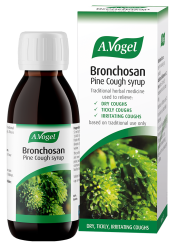An introduction to cough remedies
Cough remedies are amongst our oldest medicines. Today, both conventional medicines and licensed herbal remedies are available to treat coughs. This page describes some of the most popular cough remedies.
However, before we start, bear in mind that if your cough is the result of a health condition, it will be best to consider treating the underlying cause as well. For example, if you are coughing because of the common cold, you might like to consider the use of echinacea which has been shown in research to treat the symptoms of flu and colds by supporting the immune system.
Conventional cough medicines
These are cough remedies either prescribed by your doctor or available without a prescription from your local pharmacy. They can broadly be divided into two main categories:
- Antitussives – these are cough suppressants or ‘anti-cough’ remedies, and are useful for dry or tickly coughs. They work by dampening the body’s cough reflex. Conventional antitussives usually contain the drugs dextromethorphan, diphenhydramine or levomenthol
- Expectorants – these help to ‘bring up’ (expectorate) mucus and are used for chesty coughs. They have the ability to loosen or thin mucus which has built up in the chest, making it easier for it to be expelled when you cough. Conventional expectorant remedies usually contain the drugs ipecachuana, guaifenesin or ammonium citrate.
Some people with coughs go to their doctors expecting to be prescribed antibiotics. This form of treatment may be appropriate for some types of coughs – specifically, those caused by secondary bacterial infection. However, many coughs have other causes and in these situations, antibiotics may not be an appropriate treatment.
Herbs for dry or tickly coughs
Herbs have been used for many years to treat both dry coughs and tickly coughs. Many licensed herbal remedies are now available from your health food store or pharmacy. These generally work by soothing and reducing the urge to cough and include:
Spruce – also known as pine, these are the trees we are familiar with in winter. Extracts of the young leaves (shoots) from the Norway spruce (Pinaeae family) have been used traditionally to soothe and suppress dry and tickly coughs. These extracts can be found in syrups combined with honey such as in A.Vogel Bronchosan Pine Cough Syrup
Slippery Elm – this is another tree, but native to North America. Extracts soothe the lining of pharynx (throat), suppressing the cough reflex
Marshmallow Root – this comes from the Malvaceae family. Like Slippery Elm, it suppresses coughing by soothing irritated or inflamed mucous membranes in the throat.
Herbs for chesty coughs
A number of herbs are available to treat productive chesty coughs. These include:
- Ivy – this evergreen plant is from the Araliaceae family. It helps chesty coughs by thinning mucus and also reduces inflammation
- Thyme – medicinal use of this herb dates back to the Romans, Ancient Egyptians and the European Middle Ages. Thyme acts as an expectorant, helping to clear the respiratory tract of excessive mucus
- Liquorice root – this is from the Fabaceae family and has a very sweet taste. It also works as an expectorant
- Chesty cough remedies often contain a combination of herbs such as those found Bronchoforce Chesty Cough tincture.
Self-help measures
Whether or not you are using a cough remedy, there are a number of steps you can take to improve your cough:
- Take sufficient rest. Many people try to fight the infection by soldiering on, but this only decreases the immune system’s ability to repel the bugs
- Drink plenty of water. Coughing all day can make you dehydrated. Water can also work as an expectorant
- Smoking irritates your respiratory system. If you smoke, reduce the number of cigarettes consume whilst you attempt to recover. You may however wish to take the chance to stop for good
- Avoid smoky, closed-in or damp atmospheres as these will exacerbate the problem
- Taking a walk in the fresh air can be good for you, but note that if you have a tickly or dry cough, a sudden change in air temperature entering your lungs can lead to a bout of coughing
- Chesty coughs can be improved be inhaling menthol based preparations as these help to clear up catarrh.








